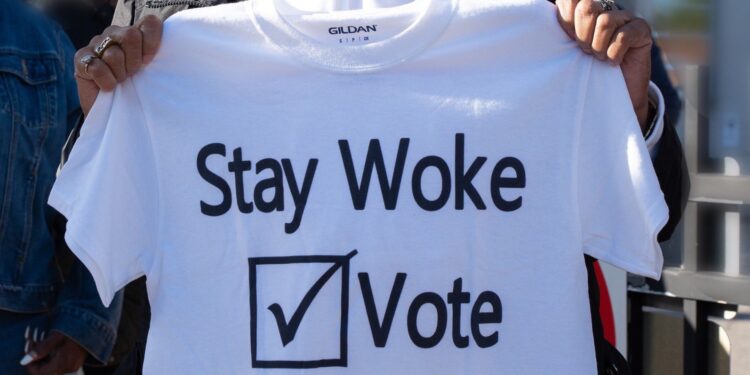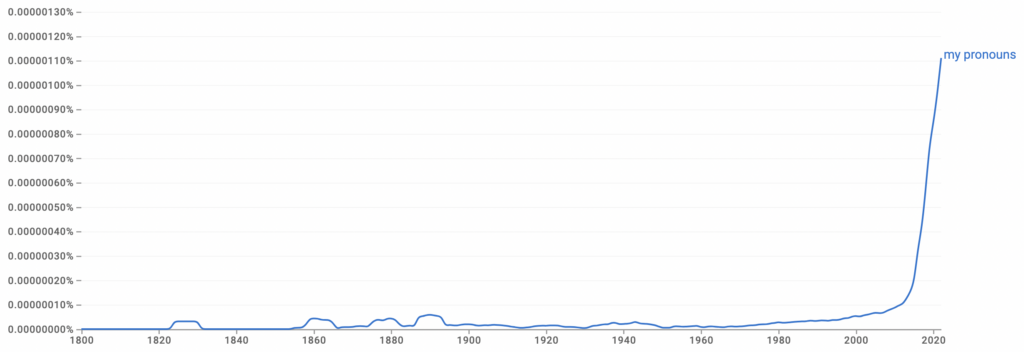One of the stranger trends to emerge from the Great Awokening was people informing others of ‘their pronouns’, meaning the pronouns by which they should be addressed in conversation and in writing. The idea was that not everyone identifies with the gender they were ‘assigned at birth’, so it would be wrong to simply assume someone’s pronouns. For example, a broad-shouldered person with stubble might prefer to be addressed as ‘she/her’. Not only that, but there emerged various new-fangled pronouns, such as ‘xe/xem’, to refer to so-called ‘non-binary’ individuals.
This trend even shows up in the Google Ngram database, which tracks the frequency of words and phrases used in books over time. As you can see, the phrase ‘my pronouns’ was barely used before 2010. But soon after, mentions of the phrase began sky-rocketing. It’s another example of the woke hockey-stick.
The funny thing is that, because people with unconventional ‘gender identities’ comprise a tiny fraction of the population, most of those who take part in the trend give their pronouns as the ones you’d expect (‘she/her’ for a woman and ‘he/him’ for a man). So in the majority of cases, giving one’s pronouns serves not to convey any unexpected information but rather to signal one’s progressive credentials. ‘My pronouns are she/her’ is mainly a way of saying ‘I hold progressive political views’.
Interestingly, this makes the practice of pronoun-giving useful for studying political discrimination. In a recent study, Ian Maupin and Bryan McCannon examined whether university admissions counselors discriminate for or against applicants who inform others of their pronouns.
They sent emails posing as applicants to admissions counselors at dozens of US universities. All the emails were the same except for the signature line: some did not include pronouns; some included standard pronouns (‘she/her’ or ‘he/him’); and some included new-fangled pronouns (‘xe/xem’). The authors wanted to know whether admissions counselors are more or less likely to respond to emails that included pronouns.
What did they find? Admissions counselors were slightly more likely to respond to emails that included pronouns: Just under 83% of emails that included pronouns received a response, compared to just under 79% of those that did not include pronouns. This suggests that admissions counselors actually discriminate in favour of progressive applicants. The authors also found that responses to emails that included pronouns were friendlier in tone, as measured by the use of emojis and exclamation marks.
It should be noted that the difference in response rate to emails that included pronouns versus emails that did not was relatively small and only borderline statistically significant. (It failed to reach statistical significance in multivariate models.) Hence the evidence of discrimination in favour of progressive applicants should be considered somewhat tentative.
However, there was no evidence of discrimination against people with unconventional gender identities, which rather undermines the woke narrative that ‘marginalized’ groups are somehow ‘oppressed’. In this case, the only ‘oppressed’ group was applicants who did not inform others of their pronouns.
In light of the borderline statistical significance, Maupin and McCannon’s study should not be considered the final word on the subject of discrimination based on pronoun-giving. But its findings won’t surprise anyone who’s familiar with what today’s universities are like.













To join in with the discussion please make a donation to The Daily Sceptic.
Profanity and abuse will be removed and may lead to a permanent ban.
My pronouns are he/haw
Very good. I like Steve Sailer’s take on this, too: Steve Sailer – My pronouns, like Stalin’s, are Who and Whom
Mine are ho/hum
That made me laugh!
As far as I’m concerned, the use of “new-fangled pronouns” is a clear sign of mental illness and so should absolutely be taken into consideration.
I’m not saying they should be marginalised or treated badly. They should be advised to seek help.
My pronouns are ../..! is basically an order to third parties that they may only refer to the person in question using the title it(?) granted to itself. This is exactly the same as Charles III. being referred to as His Majesty instead of just he. OTOH, he’s the rightful king of England but the run-of-the-mill gendertard is just a rightful dickhead who demands special treatment because he really wants to be treated specially.
People who believed they get to order around others just because they really want to ought to be advised to shut up.
Noah Carl has exposed a very important type of discrimination. I read years ago that American medical schools have long operated a policy of admitting only applicants with leftist, politically correct views, by asking inquisitorial questions specifically designed to discover any conservative tendencies in the applicant.
This should be regarded as text book example of social junk science. But considering
In light of the borderline statistical significance, Maupin and McCannon’s study should not be considered the final word on the subject of discrimination based on pronoun-giving. But its findings won’t surprise anyone who’s familiar with what today’s universities are like.
it was obviously never meant to be anything except an appeal to the prejudices¹ certain people have about today’s universities.
¹ This doesn’t necessarily mean that they’re wrong, just that they’re theories based on hearsay and personal political disposition and not an actual empirical evidence.
Can someone explain to me why it is always two pronouns (“he/him” or “she/her”)? Why not just “my pronoun is “he”? Or why not “my pronouns are he/him/his”?
It’s basically completely nuts, obviously, but presumably the nutty pronoun formulation comes from some woke book, almost certainly American.
“For example, a broad-shouldered person with stubble might prefer to be addressed as ‘she/her’. “
I identify as a broad-shouldered person with stubble and I prefer to be addressed as “you”. Most people only use the third person when talking about someone behind his/her back.